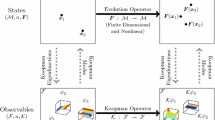Abstract
MaxEnt inference algorithm and information theory are relevant for the time evolution of macroscopic systems considered as problem of incomplete information. Two different MaxEnt approaches are introduced in this work, both applied to prediction of time evolution for closed Hamiltonian systems. The first one is based on Liouville equation for the conditional probability distribution, introduced as a strict microscopic constraint on time evolution in phase space. The conditional probability distribution is defined for the set of microstates associated with the set of phase space paths determined by solutions of Hamilton’s equations. The MaxEnt inference algorithm with Shannon’s concept of the conditional information entropy is then applied to prediction, consistently with this strict microscopic constraint on time evolution in phase space. The second approach is based on the same concepts, with a difference that Liouville equation for the conditional probability distribution is introduced as a macroscopic constraint given by a phase space average. We consider the incomplete nature of our information about microscopic dynamics in a rational way that is consistent with Jaynes’ formulation of predictive statistical mechanics, and the concept of macroscopic reproducibility for time dependent processes. Maximization of the conditional information entropy subject to this macroscopic constraint leads to a loss of correlation between the initial phase space paths and final microstates. Information entropy is the theoretic upper bound on the conditional information entropy, with the upper bound attained only in case of the complete loss of correlation. In this alternative approach to prediction of macroscopic time evolution, maximization of the conditional information entropy is equivalent to the loss of statistical correlation, and leads to corresponding loss of information. In accordance with the original idea of Jaynes, irreversibility appears as a consequence of gradual loss of information about possible microstates of the system.
Similar content being viewed by others
References
Jaynes, E.T.: Information theory and statistical mechanics. Phys. Rev. 106, 620–630 (1957)
Jaynes, E.T.: Information theory and statistical mechanics. II. Phys. Rev. 108, 171–190 (1957)
Gibbs, J.W.: Elementary Principles in Statistical Mechanics. Yale University Press, New Haven (1902)
Shannon, C.E.: A mathematical theory of communication. Bell Syst. Tech. J. 27, 379–423, 623–656 (1948). Reprinted in: Shannon, C.E., Weaver, W.: The Mathematical Theory of Communication. University of Illinois Press, Urbana (1949)
Jaynes, E.T.: Information theory and statistical mechanics. In: Ford, K.W. (ed.) 1962 Brandeis Lectures in Theoretical Physics, vol. 3, pp. 181–218. W.A. Benjamin, Inc., New York (1963)
Jaynes, E.T.: Gibbs vs Boltzmann entropies. Am. J. Phys. 33, 391–398 (1965)
Jaynes, E.T.: Where do we stand on maximum entropy? In: Levine, R.D., Tribus, M. (eds.) The Maximum Entropy Formalism, pp. 15–118. MIT Press, Cambridge (1979)
Jaynes, E.T.: The minimum entropy production principle. Annu. Rev. Phys. Chem. 31, 579–601 (1980)
Jaynes, E.T.: Macroscopic prediction. In: Haken, H. (ed.) Complex Systems—Operational Approaches in Neurobiology, Physics, and Computers, pp. 254–269. Springer, Berlin (1985)
Grandy, W.T.: Principle of maximum entropy and irreversible processes. Phys. Rep. 62, 175–266 (1980)
Garrod, C.: Statistical Mechanics and Thermodynamics. Oxford University Press, New York (1995)
Jaynes, E.T.: The second law as physical fact and as human inference. Unpublished manuscript (1990). http://bayes.wustl.edu/etj/node2.html
Zurek, W.H.: Algorithmic randomness and physical entropy. Phys. Rev. A 40, 4731–4751 (1989)
Duncan, T.L., Semura, J.S.: The deep physics behind the second law: information and energy as independent forms of bookkeeping. Entropy 6, 21–29 (2004)
Duncan, T.L., Semura, J.S.: Information loss as a foundational principle for the second law of thermodynamics. Found. Phys. 37, 1767–1773 (2007)
Grandy, W.T.: Time evolution in macroscopic systems. I. Equations of motion. Found. Phys. 34, 1–20 (2004)
Grandy, W.T.: Time evolution in macroscopic systems. II. The entropy. Found. Phys. 34, 21–57 (2004)
Grandy, W.T.: Time evolution in macroscopic systems. III. Selected applications. Found. Phys. 34, 771–813 (2004)
Tishby, N.Z., Levine, R.D.: Time evolution via a self-consistent maximal-entropy propagation: the reversible case. Phys. Rev. A 30, 1477–1490 (1984)
Plastino, A.R., Plastino, A.: Statistical treatment of autonomous systems with divergenceless flows. Physica A 232, 458–476 (1996)
Plastino, A., Plastino, A.R., Miller, H.G.: Continuity equations, H-theorems, and maximum entropy. Phys. Lett. A 232, 349–355 (1997)
Plastino, A.R., Plastino, A.: Universality of Jaynes’ approach to the evolution of time-dependent probability distributions. Physica A 258, 429–445 (1998)
Schönfeldt, J.-H., Jimenez, N., Plastino, A.R., Plastino, A., Casas, M.: Maximum entropy principle and classical evolution equations with source terms. Physica A 374, 573–584 (2007)
Khinchin, A.I.: Mathematical Foundations of Statistical Mechanics. Dover, New York (1949)
Wan, F.Y.M.: Introduction to the Calculus of Variations and Its Applications. Chapman & Hall, New York (1995)
Kittel, C.: Elementary Statistical Physics. Wiley, New York (1958)
Zurek, W.H., Paz, J.-P.: Decoherence, chaos, and the second law. Phys. Rev. Lett. 72, 2508–2512 (1994)
Zurek, W.H.: Decoherence, einselection, and the quantum origins of the classical. Rev. Mod. Phys. 75, 715–775 (2003)
Jaynes, E.T.: Probability Theory: The Logic of Science. Cambridge University Press, Cambridge (2003). Bretthorst, G.L. (ed.)
Zwick, M.: Quantum measurement and Gödel’s proof. Specul. Sci. Technol. 1, 135–145 (1978)
Gödel, K.: On Formally Undecidable Propositions of Principia Mathematica and Related Systems. Basic Books, Inc., New York (1962)
Nagel, E., Newman, J.R.: Gödel’s Proof. New York University Press, New York (1960)
Pattee, H.H.: Postscript. In: Pattee, H.H. (ed.) Hierarchy Theory, pp. 131–156. George Braziller, New York (1973)
Acknowledgements
Authors wish to thank the anonymous reviewer for insightful suggestions that significantly improved the submitted manuscript. The present work was supported by Croatian MZOS project no. 177-1770495-0476.
Author information
Authors and Affiliations
Corresponding author
Rights and permissions
About this article
Cite this article
Kuić, D., Županović, P. & Juretić, D. Macroscopic Time Evolution and MaxEnt Inference for Closed Systems with Hamiltonian Dynamics. Found Phys 42, 319–339 (2012). https://doi.org/10.1007/s10701-011-9604-x
Received:
Accepted:
Published:
Issue Date:
DOI: https://doi.org/10.1007/s10701-011-9604-x




